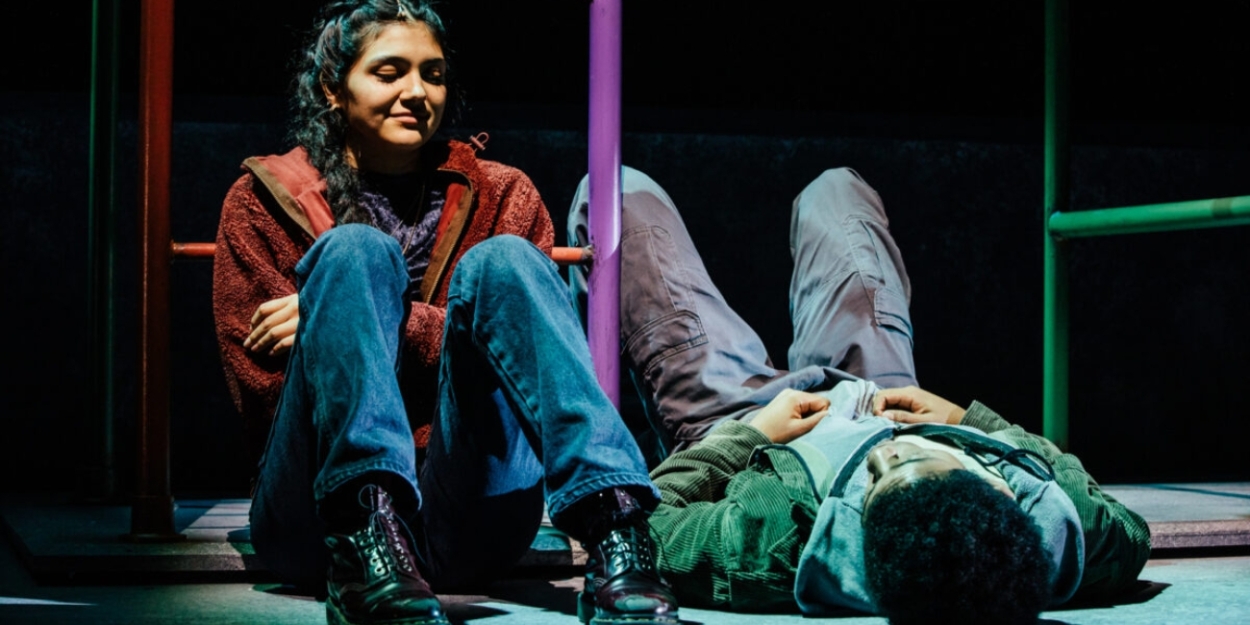Review: SANCTUARY CITY at Pasadena Playhouse
Martyna Majok's insightful, compassionate play about the plight of dreamers continues through Oct. 9 at the Pasadena Playhouse

Boy meets girl. Girl loves boy, Twin towers fall. Marriage is planned, then abandoned, then planned again. Country doesn't evolve.
Playwright penetrates keenly. Again.
As she has demonstrated many times in her prolific career, playwright Martyna Majok looks at America in ways that other playwrights don't, with insight, compassion, wit, bitterness and a fierce sense of irony. While Angelenos await the arrival (hopefully soon) of her Pulitzer Prize-winning THE COST OF LIVING, we can happily flex our intellectual muscles with Majok's 2018 play, SANCTUARY CITY, experiencing a searing production at The Pasadena Playhouse. As directed by Zi Alikhan with a pitch-perfect technical team and acted to the nines by Ana Nicolle Chavez, Miles Fowler and Kanoa Goo, SANCTUARY CITY is the kind of intelligent evening that may get you talking before the final blackout. The attendees seated behind me couldn't hold back; Who can blame them.
Majok is telling a story of immigrants, a young man and a young woman, who come to the United States from different countries (from where exactly isn't clear) as young children and meet in an English learners class. As they grow up and face family upheaval, they look out for each other while also keeping their eyes on a future that - for dreamers - has roadblocks. The girl becomes naturalized, which means doors open for her that do not open for her friend, but she won't leave him behind.
Their scenes as teen-agers take place in an off-colored jungle gym-like structure (designed by Chika Shimizu) that doubles as her house and his apartment, somewhere in a working-class section of Newark, New Jersey. When things get chaotic at home, the girl invariably ends up at his place asking, "Can I crash with you tonight?" The boy lets her into his room and, often, into his bed. And these two simultaneously very innocent yet very experienced young people can hold hands and protect each other against the cold. The play begins in the winter of 2001, and both characters are 17 years old and dark skinned, meaning - with September 11 in the immediate rear view mirror - life is about to get even more difficult for their parents and for both of them.
Majok names her protagonists B (played by Miles Fowler) and G (Ana Nicholle Chavez) and they never refer to each other by name. We get it; these people are all but nameless, but as embodied by Chavez and Fowler, they are anything but soulless. Chavez's feisty, fiercely ungirly G is loyalty and resoluteness personified. Her tender chemistry with Fowler's more vulnerable B is beautiful (and ultimately heartbreaking) to watch. These characters met as third graders in an ESL class and, in Fowler and Chavez's hands, the bond that both links and threatens to fracture them is never in question.
When the action of SANCTUARY CITY moves to 2006, B and G inevitably drift apart. G escapes Newark to go to college in Boston leaving B to set aside his college dreams and continue bartending at a restaurant. Having reneged on a promise to marry her longtime friend so he can become naturalized, G has returned and is now reconsidering despite the substantial consequences to both if they are caught. Henry (Kanoa Goo) a law school student and friend of B's brought in to be a witness, introduces a whole new set of complications. Where the pre-college scenes were a delirious mixture of hope, dreams, love and fear, the final act of SANCTUARY CITY, set in B's apartment, bristles with tension, guilt and regret. While we did not necessarily see Majok steering the play in this direction, the play's arguments are intelligent and the outcomes are riveting. The insight that Majok has into the plight of immigrants is plentiful and, in director Alikhan's hands, nothing short of mesmerizing to watch.
Chavez and Fowler, so convincing as teen-agers, are equally poignant as they bring their characters into adulthood. Fowler's bitterness and increasing isolation at feeling as though being left behind is especially heart-breaking. And as Henry, Goo brings a heady dose of pragmatism and bitterness. He's not always kind, but he gets it.
Majok effectively uses repetition to drive home patterns, tropes and themes. We might see B or G employ a series of ailments (the flu? Mumps? not lice) to excuse a school absence. Or the two friends will be in bed together, giving each other thanks. "It's OK," is the invariable response, which Chavez and Fowler find a myriad number of ways to deliver.
Not surprisingly, SANCTUARY CITY ends with a question "What are you gonna..." that also repeats and trails off, unfinished and certainly unanswered. There is no completing that query in this marvelous and relevant play, but audiences should delight in the ambiguities.
SANCTUARY CITY plays through Oct. 9. The Pasadena Playhosue is offering a free ticket initative for the remainder of the run of SANCTUARY CITY. Audience members for whom cost is a barrier can email the box office or call patron services at (626) 356-7529 to get free tickets.
Photo of Ana Nicolle Chavez and Miles Fowler by Jeff Lorch
Reader Reviews
Videos

